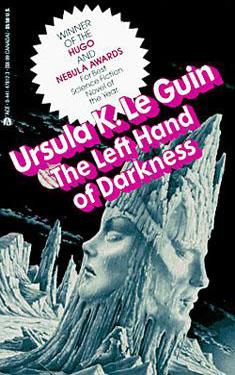Ursula K. LeGuin
Read 2012, reviewed 4/21/2013, revised 10/9/2013
5 stars
I first read this book in my college Science Fiction
class. I remember loving the concept,
but being confused by the bouncing narrative. Upon my current reading, I realized
that this book is brilliant. It’s an
amazing commentary on the importance we place on gender and gender roles, and
how quickly we judge based on any deviation from the norm.
 Set in LeGuin’s Hainish universe, “Left Hand of Darkness”
begins with the arrival of an emissary from Terra, Genly Ai, who has come to
the planet Gethen, or Winter, to invite them into the Ekumen, a union of the
known inhabited planets of this universe.
The inhabitants of Gethen are incredibly strange to Ai in that they are
androgynous. They have no gender until
they enter a state called kemmer, the time for reproducing. When they enter kemmer, they may be male or
female, and may therefore be a mother or a father of children. In the same way, Ai is considered a pervert, seen
as being always in the kemmer state.
Set in LeGuin’s Hainish universe, “Left Hand of Darkness”
begins with the arrival of an emissary from Terra, Genly Ai, who has come to
the planet Gethen, or Winter, to invite them into the Ekumen, a union of the
known inhabited planets of this universe.
The inhabitants of Gethen are incredibly strange to Ai in that they are
androgynous. They have no gender until
they enter a state called kemmer, the time for reproducing. When they enter kemmer, they may be male or
female, and may therefore be a mother or a father of children. In the same way, Ai is considered a pervert, seen
as being always in the kemmer state.
The main action of the novel takes place as Ai and a disgraced
Gethen prime minister, Estraven, make an incredible trek across the hostile
frozen landscape. During their journey,
Ai comes to understand the planet, its politics, and the nature of its people.
I often find a coldness to many of LeGuin’s works. Here, this feeling is exemplified by the icy
planet on which the story takes place.
It is cold and harsh. So is the
society. So is the circumstance of
finding love.
Despite the chill of the story telling style, the characters
are somehow fully realized. I empathized
with Ai and Estraven, and was completely drawn in by their relationship.
LeGuin has an amazing gift for fully realizing an entire
society, with history and mythology. She
uses narrative, diary entries, folk tales, and songs to create rich insight
into Gethen. My main problem when I
first read this book in college was that I did not understand the change in
voice between the chapters resulting from this variety of information. Upon this re-read thirty years later, I fully
grasped the complexity of the book.
This is truly a 5 star book.
I love many of LeGuin’s novels, but in this one, I feel the coldness
of the planet and ache in the despair of the main characters. At a time when Hugo winning male SF writers
were barely giving voice to female characters, LeGuin was contemplating gender
and xenophobia in remarkable ways. Even
after 40 years of mostly positive societal changes, it still holds up as a relevant and profound exploration of the nature of love, sexuality, and the Other.
Hey! I followed the rabbit hole from WWEnd...I loved The Left Hand of Darkness, too, but do you ever read any fantasy? Because Le Guin's Earthsea books don't have that same disconnected/cold feeling I get from her sci-fi.
ReplyDeleteAlso, I ran across this pretty hilarious New Yorker article she wrote, which talks about how she submitted her early short stories under gender-neutral initials and wrote her bio blurbs to craftily confuse the issue...http://www.newyorker.com/reporting/2012/06/04/120604fa_fact_leguin
Hi and thanks for checking out my blog and leaving a comment! I read Earthsea in college for a Fantasy Lit class and loved it. It's on my list of rereads. I also want to read "Lathe of Heaven" and some of her work written after the 70s.
DeleteThanks for the link. I saw her at a taping of a local Portland OR radio show called "Live Wire" a few years ago promoting "Lavinia." She had some amazing stories about trying to get published. She has a great presence. She's one of those people I'd love to sit talk with for a few hours over coffee and pastries!